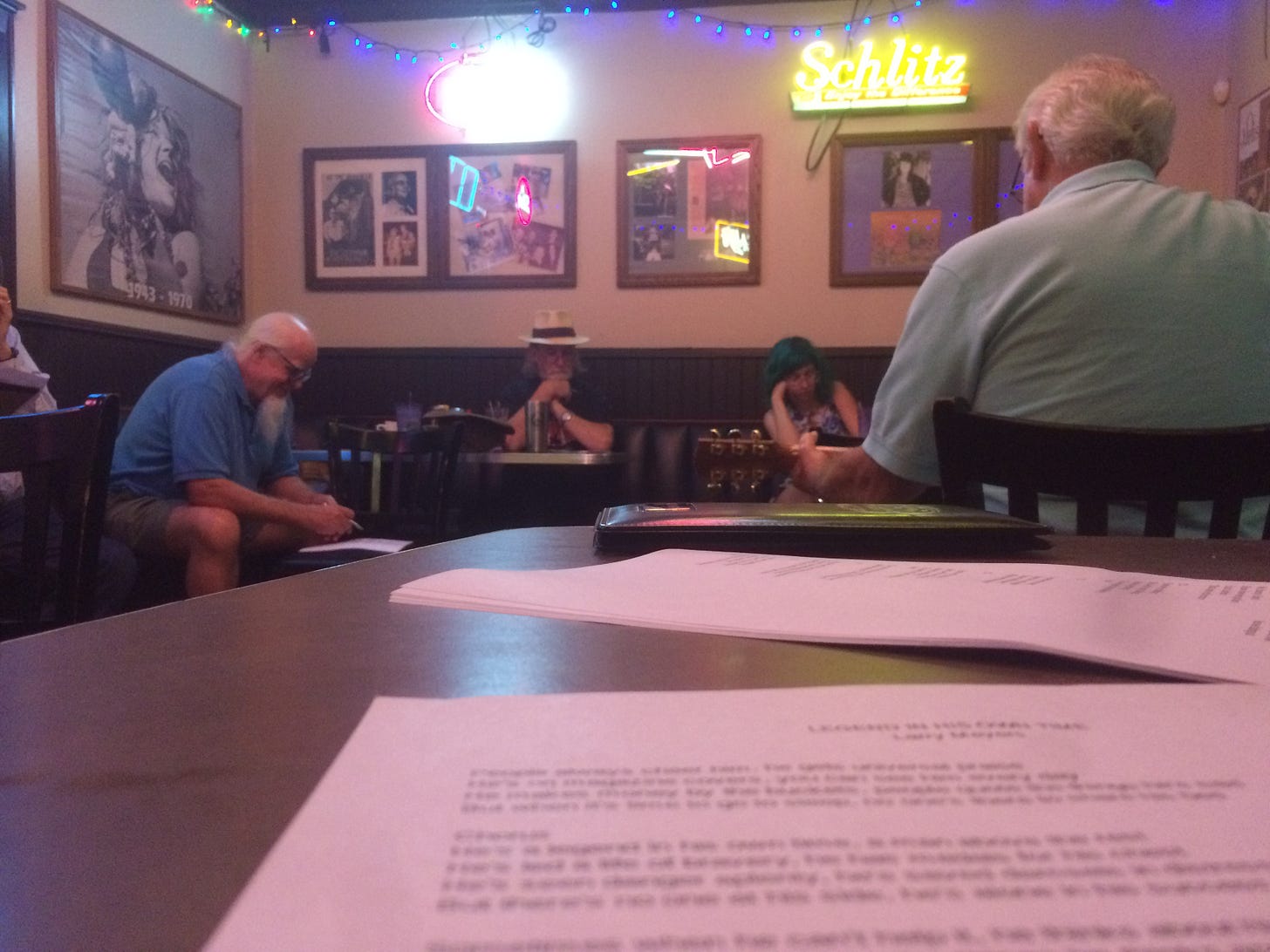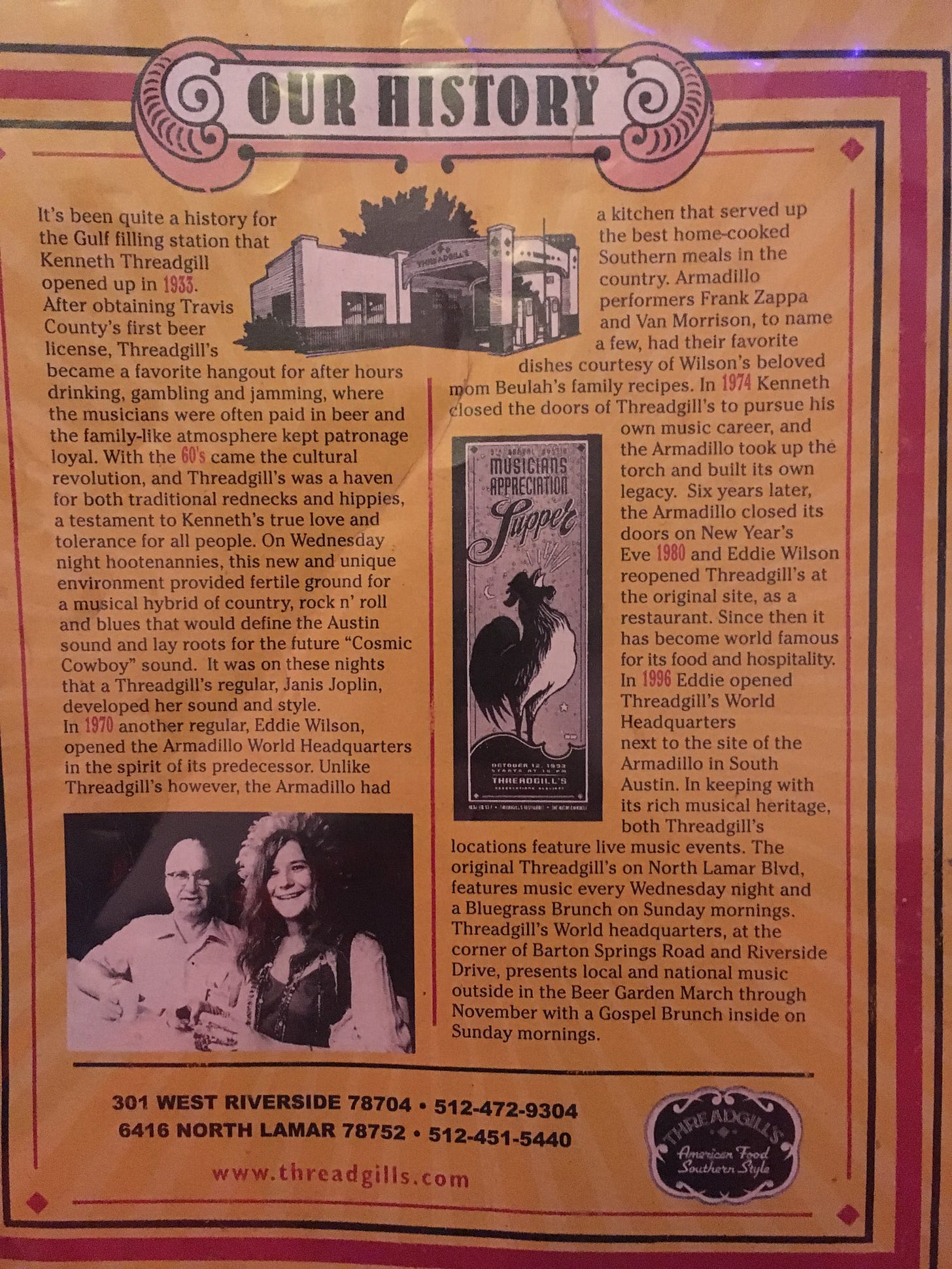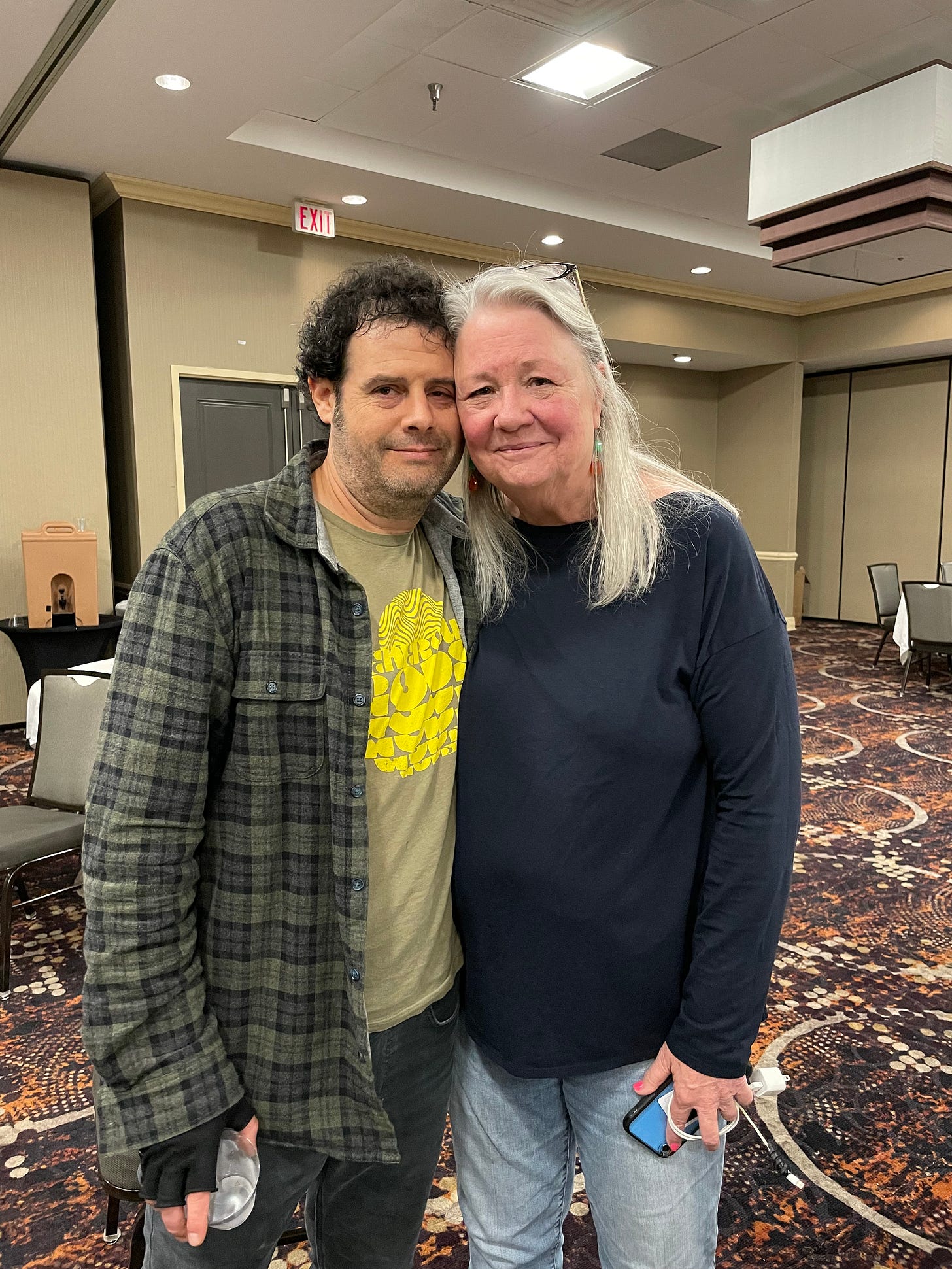In 2016, I started spending time in Austin, Texas. Having always had musician friends, I sought community among them. Fortunately, I stumbled into a group called the Austin Songwriters Group (“ASG”). They have been around for decades. Lee Duffy, the leader and now one of my songwriting mentors, used to write and sing with Waylon Jennings, Willie Nelson, and seemingly the whole of the 70s outlaw country crew. She has been around, seen some things, and has stories; folks listen when she speaks and offers an opinion. Rightly so. I would guess she has heard and critiqued 20,000+ songs in her lifetime. Further, at least indirectly, every person reading this has listened to a song written by someone she has had an impact on; I conservatively estimate that impact has contributed to the sale of millions of albums and billions of streams. It is a life well lived.
She and ASG1 changed my life.
In 2016, before COVID-19 and the brutal early 2020s, ASG used to meet at Threadgill’s on North Lamar in Austin every Monday at 7:00 pm for an event called The Song Doctor. Threadgill’s is where Janis Joplin started; ASG would meet in the “Janis Joplin” room.
While I had written some objectively decent songs before meeting/joining ASG, I can say with absolute certainty that The Song Doctor improved my writing exponentially.
The concept of The Song Doctor was/is simple. Anyone can show up with a song and a few copies of lyrics printed on paper (lyrics alone are OK). When it’s your turn, you pass out the lyrics (pens are provided for those attending to provide written feedback), perform or play your song for those in attendance and get immediate feedback from whoever is in the room. The input/critique comes via a discussion following the performance; attendees are also encouraged to make notes on the papers handed out to give back to the songwriter to take home and review.
Since 2016, I have critiqued close to, if not more than, 2,000 songs this way2. Further, I have brought 100+ songs I have written to be workshopped. Most of the songs I wrote for my most recent album, Texnia3, were workshopped via The Song Doctor. It made the songs better, and it also helped me to create a vibe and direction that I wanted to pursue in the writing. I started very scattershot in terms of writing style and then narrowed it down as I wrote more and more.
Here are a few pictures of the inside of the Janis Joplin room at Threadgill’s:
The following is what I have learned about songwriting, workshopping, and, perhaps, pursuing a creative art more generally, from The Song Doctor/songwriting-workshop experience both as a writer and also as a listener/critiquer4:
1) Rules. There Are No Rules! Well… actually… there are, BUT you do not need to know ANY or ANYTHING about music to write songs. Some of the best songs ever written were by people who could not tell you the first thing about what they were doing from a musical theory standpoint; this is rad. AND it is beneficial to try and learn some of the rules as you go along. It will help you to be more a part of every conversation, and you will see it translate into improved writing.
Further, learning some rules will allow you to create a more listenable song every time; knowing how to break those rules can also lead to exceptional songs. Importantly, anyone can learn these rules. There are books on them, and you can pick up many by listening to conversations in workshops like The Song Doctor. I am happy to offer suggestions in the comments if anyone is curious.
2) It takes time and consistent effort to improve.
3) The next song you write will probably not be a hit (this is true of professional writers in Nashville as well), even if it is the best one you ever wrote5.
Everyone writes songs. This, of course, is not entirely true... Importantly, no one but you can write YOUR songs, which is rad! However, it is essential to remember that there is an obscene number of songwriters. More than 50% of the people I met in Austin wrote songs and played music6. This is a lot of people and translates into a lot of songs. It is essential to maintain perspective and recognize that writing a “hit” song is hard to achieve. Plus, when you talk to the folks who make a living at it, it was almost always through tremendous effort and years of honing their craft. If you are writing consistently then you are on the path - at minimum - to improvement. It seems that the people who get the most enjoyment and have the least amount of frustration with writing and creating temper their expectations and set shorter distance goals (i.e., finish the next song, try and use a minor 5 in the next song, write a song inspired by a tv show, etc…) rather than write a song that the world loves.
4) Some songs are objectively better than others, but perfect songs do not exist; excellent performances and execution of certain songs exist7. This might make something perfect or approach it!
I raise this point to emphasize that the writing process is separate from performance. When writing a song you are trying to give it the best structure and bones possible for it to be presented to an audience at some future time. You may or may not be a part of that performance. Remembering you do not have to wear all the hats during the writing phase (or any phase) can be liberating. I think newer writers get stuck on this all the time.
5) Set goals for your writing. If you are not achieving them after a certain period (three months, nine months, two years), consider changing something in your approach.
6) Make time to hone your craft with the help of others regularly. The more you write, listen, and participate in discussions related to your songs and others, the better you will get at self-editing, and the better your songs will be. Bonus: you will likely build a community, leading to friendships, collaborations, and human life growth. It certainly has happened to me. This is invaluable.
7) Every song you start can wind up in multiple places, and most songs can be improved by workshopping them8. Thus, start from the position: “My song is not good enough – yet” upon entering a workshop session or even considering ways you might change or edit it. If you do, your song will improve.
8) There is no shame in editing. There is no harm in trying multiple ideas and pursuing various paths in a song. Rarely does anyone get something perfect the very first time out. Trying and exploring often leads to creative, better solutions. Further, pushing yourself outside your comfort level will raise the ceiling for future levels of improvement you can achieve.
9) When seeking feedback, do not introduce your song9. Let it speak for itself. Should the song be played on the radio someday, you will—most likely—not have the opportunity to explain it to a listener. Treat a feedback session like that experience. It is your chance to be a fly on the wall and hear what people have to say about your work without any context. It will inform how you edit it—if you edit at all.
10) The song is done when the writer decides it is done. Sometimes, it is never done. Bob Dylan said he never recorded the best take of a song; he constantly changes - and in his view - improves them on the road10. While this is part of the process, try to avoid getting stuck on any one song. You can always write another one. It took me years to learn this. I used to write and write and rewrite certain songs. While I made incremental improvements to the songs, they weren’t great songs to start. Thus, I was often only “polishing a turd.” I see fellow writers struggle with this a lot. I started to learn and improve more when I began to write more songs and be less “precious” about any one song. Further, writing more allowed me to analyze why certain songs, or parts of songs, didn’t work so I could avoid that in the future. It also gave me material to go back to down the road when I had learned more and reset my perspective to see if I had anything worth putting extra effort into.
11) This brings me to my next point: Revisiting after a chunk of time has passed. Time brings perspective. I have workshopped as a writer and listener, songs that have taken years and countless iterations to finalize. Usually, the most drastic improvements come in months and years between rewrites versus weeks. This is less true if the song was 90% “there” at the last workshop session.
12) Ego. Try to kill it. Be realistic about your strengths and weaknesses and listen to those who have strengths in the areas that are your weaknesses. Recognize that if you are not yet making your living as a songwriter, you probably still have things to learn. However, note, that you are in good company; most of us are in this category! For a long while, there will likely be people in the room who are better at writing than you; listen to them, ask them questions, and try to figure out why they are better. Emulate and build on that. We learn from each other. The longer you do it, the more likely you will transition into the role of the wise person in the room, offering gems of wisdom to the newer folks. A common goal of songwriting is to reach and affect others through songs; the songwriting community11 presents a ripe opportunity for helping others along whatever path they are on with their art, and there are opportunities for it to help you with yours.
13) Most Important: If you bring your song to a workshop, be open to feedback. Try to listen to the input – and I know this is hard: don’t be defensive. It’s ultimately your song. You don’t have to agree with anything anyone says, but defending your choices at a critique session is usually not helpful unless asked to do so. Remember: you get to decide when your song is done, and when that time comes, you can play it to an audience that is there only to listen.
-end-
Sadly, Threadgill’s was a casualty of the pandemic; The Song Doctor was not. It meets virtually now every Monday and Thursday at 7:00 PM CST. Attend by signing up for the email list on their website here. All are welcome, it is free, but I would highly encourage folks to join the organization (they have members all over the world). The membership fee is incredibly reasonable and as they say: it is about Songwriters serving Songwriters12!
Importantly, there are other groups like this around the country and world. I have attended them virtually and in person in Illinois and California respectively. If the concept is intriguing, join The Song Doctor, find one in your area, online, or start your own, though I am highly partial to The Song Doctor!
Here is some history on Threadgill’s from a poster that hung on a wall there.
Here is a picture of my friend, Lee Duffy, and I at the ASG symposium this year13. Thanks for everything Lee.
Rick, Gregg, and the rest of the crew I am looking at y’all too.
I also started a similar group in Davis, Ca during the pandemic and have attended some other similar groups over the years in various cities.
Out in 2024.
Being in the room with Lee countless times among the other fine songwriters of ASG has informed this article.
If you are a professional Nashville songwriter, and it is in fact the best song you have ever written, then it might be a hit.
I was also actively looking to meet songwriters and musicians.
The converse is also true. Imagine if the only version of your favorite song you ever heard was at 1:40 am at the last karaoke night you were at; very good chance it would not still be your favorite song.
90+% of the time, professional songwriters write with others; this is a workshop. They are getting immediate feedback on ideas from someone who makes a living – like them – writing songs. Thus, there is no shame in workshopping ideas. Authors, playwrights, actors, circus performers – nearly everyone who makes art – gets feedback on what they are doing along the way. Ask for and accept help. It will make your tunes better.
This is the “Play the song ya Bastard rule”. At some point during an ASG event someone introduced a song, and inevitably the intro drug on and in; I am sure it was longer than the song. This is not uncommon. Someone in the room yelled, “Play the song ya Bastard,” and ever since it is used for those that get carried away with song intros.
https://www.huffingtonpost.co.uk/entry/bob-dylan-exclusive-inter_n_187216
Though, I suspect, the same could be said for any group of creative individuals.
I have no financial interest in the organization only gratitude.
The picture was taken on 2.11.24 and added on 2.12.24. I didn’t have any pictures of us to share before the article was written.









